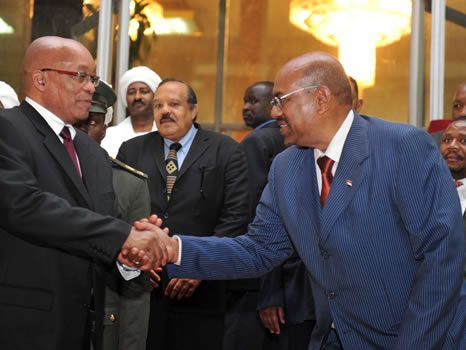
Failure to Arrest al-Bashir Undermines International Justice
Last week, in defiance of an International Criminal Court (ICC) arrest warrant and an order by the South African High Court barring his exit, Omar al-Bashir boarded a plane back to Sudan after attending the 25th African Union (AU) Summit in Johannesburg. In 2009, the ICC issued two arrest warrants against al-Bashir under charges of war crimes, crimes against humanity, and genocide. South Africa, as a State Party to the Rome Statute, is obliged to execute ICC arrest warrants, but on June 5, South Africa and the AU signed an agreement guaranteeing diplomatic immunity to participating heads of state. The South African High Court initiated a case to investigate whether the ICC warrant trumped the diplomatic immunity agreement and ordered authorities to prevent al-Bashir from leaving until a final decision had been made. The South African government, however, violated that order, resulting in alarming ramifications for the ICC and its potential efficacy in other countries like Syria.
While ICC State Parties have defied arrest warrants in the past, South Africa, a country that struggled through its own transitional justice process and has been an advocate for human rights, seemed an unlikely candidate to undermine international justice. South Africa’s former president and renowned human rights leader, Nelson Mandela said in an interview that one of the pillars for South Africa’s foreign policy would be “considerations of justice and respect for international law.” But under the leadership of President Jacob Zuma, the government not only disregarded international law, it violated its own constitution and destabilized national trust in the judiciary.
The controversy in South Africa, however, has exposed deep cracks in the ICC model. Since its establishment in 2002, African leaders have expressed concern that the ICC has been biased against African heads of state. The ICC, for its part, has done little to counteract these negative perceptions. While there are many cases of war crimes committed in other parts of the world, the Office of the Prosecutor has only opened investigations into those in Africa. Although, legal and jurisdictional restrictions prevent the Office of the Prosecutor from investigating every instance of a war crime, the fact that the UN Security Council must refer cases to the ICC politicizes the process and prevents investigations into the actions of permanent members and their allies.
ICC evidence gathering has also been politically charged and prone to manipulation. Moreover, the ICC has been unable to conduct adequate outreach in the countries in which it conducts investigations because it has no localized mechanisms that can make connections with victims and civil society groups. As a result, opposition, particularly in Africa, has grown, leading to deliberate efforts to undermine ICC decisions. These actions set a precedent, signaling to the world that the ICC indictment is not guaranteed justice and the culture of impunity has not ended.
The disillusionment is exacerbated by the fact that the ICC has few success stories to tout, giving the impression that it is following a model of investigations without prosecutions. Without support from State Parties and no clear successes, the ICC will increasingly be viewed as unreliable and an expensive waste of resources. For transitional justice experts, the ICC is one tool in the transitional justice toolkit, but the lack of trust in the ICC erodes its value in conflict and post-conflict settings and limits the approach to a holistic justice and reconciliation process.
Unlike the growing resentment among Africans, Syrians have often lauded the ICC as a valuable deterrence against Syrian government aggression. Often, the expectations of Syrians are not grounded in what the ICC is actually able to achieve. Since Syria is not a State Party to the Rome Statute, the Office of the Prosecutor cannot launch a prosecution on its own and needs a U.N. Security Council mandate before addressing the Syrian crisis. Even if the Security Council passes a resolution, the ICC will only launch investigations against a few high-level perpetrators — not every official who has been responsible for atrocities. If the ICC decides to prosecute Syrian President Bashar Al-Assad, it will need to bring him into custody before a trial can begin, and as the case of al-Bashir demonstrates, Assad can evade a trial for years, particularly if State Parties do not take seriously their duty to apprehend him.
Meanwhile, the ICC needs to be more cognizant of its past missteps in countries like Libya, Kenya, and Sudan and take a more inclusive approach in Syria. If the ICC investigates Assad, transparency, local outreach to Syrians, and coordination with the region will be key to its success. Syrian victims should be informed throughout the process and included in hearings and decision-making. With corrupted institutions and a judiciary wrecked by war, the ICC may be Syria’s first available means to achieve justice. For both the ICC and Syrians, the stakes are great and the impetus for engagement should begin before the conflict ends. The ICC has already begun losing Africa; it will need to launch a concerted effort to ensure that it does not lose the support of the Middle East as well.
For more information and to provide feedback please email SJAC at [email protected].